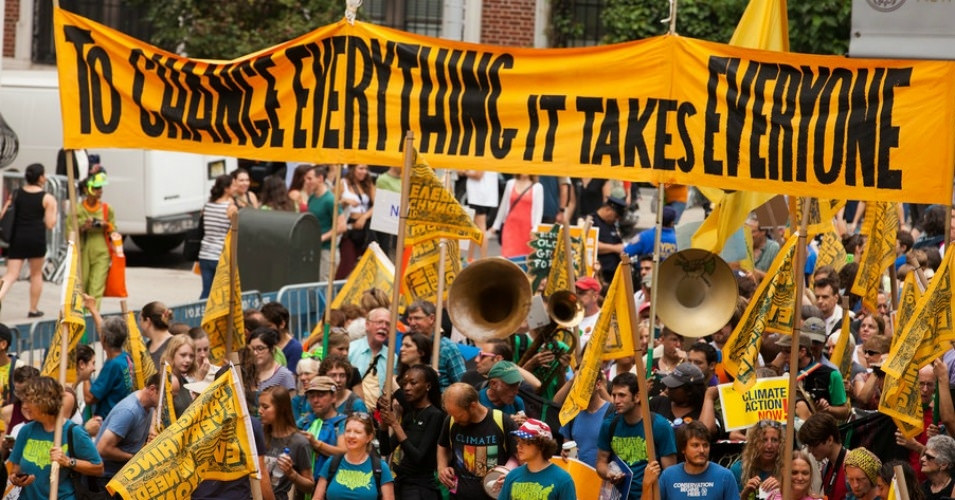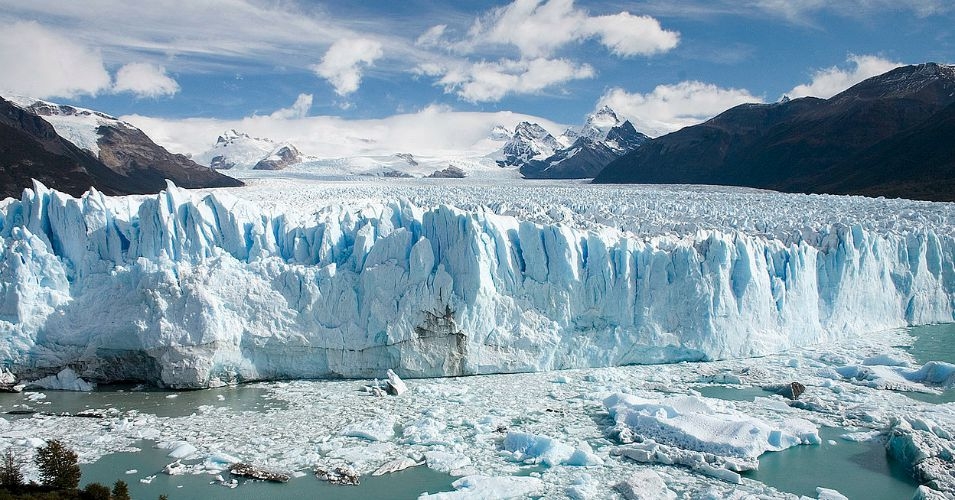We must reduce global carbon emissions and we must do it now, concludes a landmark report released in Copenhagen on Sunday by the United Nations climate science body, the Intergovernment Panel on Climate Change (IPCC).
Said to be the official world on climate change from the world’s top climate scientists, thefinal summary report (pdf) underscores three major facts about climate change: it’s man-made and already having dangerous impacts across the globe; if the world community acts now, warming can still be kept below the politically agreed upon “safe” limit of 2 degrees Celsius; the ability to secure a safe climate future is not only possible but also economically viable.
“In the starkest terms ever used, the scientific community is looking world leaders directly in the eye and demanding that they wake up,” said Sierra Club Executive Director Michael Brune in a statement following the report’s release.
The Synthesis Report, the last installment of the UN body’s Fifth Assessment Report (AR5), builds on a series of recent IPCC reports that have been released over the last 12 months and have detailed the science, impacts and solutions for climate change. It is expected to provide a foundation for international negotiations at the United Nations Framework Convention on Climate Change (UNFCC) in Paris next year.
The report states decisively that global warming is “unequivocal” and that humanity’s role in causing it is “clear,” adding that recent anthropogenic emissions of greenhouse gases are the highest in history with “widespread impacts on human and natural systems.”
Further, without “substantial and sustained reductions in greenhouse gas emissions,” the scientists warn that it is very likely that heat waves and extreme precipitation events will become more frequent and intense, that the ocean will continue to warm and acidify, while the global mean sea level will also continue to rise.
“Continued emission of greenhouse gases will cause further warming and long-lasting changes in all components of the climate system, increasing the likelihood of severe, pervasive and irreversible impacts for people and ecosystems,” the summary states.
The IPCC report also notes that human populations in developing countries “that lack the resources for planned migration” will likely experience “higher exposure to extreme weather events.” And overall, climate change impacts are projected to “make poverty reduction more difficult, further erode food security, and prolong existing and create new poverty traps, the latter particularly in urban areas and emerging hotspots of hunger.”
Despite these dire warnings, the IPCC report says that such a fate can be mitigated if the world community can commit to dramatic carbon reduction so that global greenhouse gas emissions peak by 2020 and fall to zero later this century.
Climate campaigners welcomed the report, namely the scientists’ call for zero global emissions, agreeing that the only way to reach such a goal is with reduced consumption coupled with a complete switch to renewable energy.
“This landmark report makes it absolutely clear: we must rapidly transition to a clean energy economy free from dirty fossil fuels, and we must do it now.”
—Michael Brune, Sierra Club
“This landmark report makes it absolutely clear: we must rapidly transition to a clean energy economy free from dirty fossil fuels, and we must do it now,” saidBrune. “The silver lining to the report is that it recognizes clean energy climate solutions are affordable and ready to deploy.”
“We do not need any more reports,” Brune added. “We need action.”
And Martin Kaiser, Greenpeace head of international climate politics, added: “For scientists, there is nothing vague about how to deal with climate change. Governments need to pay attention and phase out coal and oil now or end up doing it later at a much higher cost. However, those who seize the potential of renewable energy will leap ahead to a sustainable future.”
“The scientific community across the world is sounding the alarm,” said Independent Vermont Senator Bernie Sanders in a statement ahead of the report’s release. “Climate change is real and it will have devastating consequences around the globe unless we act boldly and decisively.”
Going forward, the panel concludes that both adaptation and mitigation are essential to manage the risks of climate change and that only with “cooperative responses, including international cooperation” can we effectively mitigate greenhouse gas emissions and address the already-present global warming impacts.
Emission cuts coupled with adaption measures “raise issues of equity, justice, and fairness,” says the report. “The evidence suggests that outcomes seen as equitable can lead to more effective [international] cooperation.”
Governments of the world’s richest countries have faced harsh criticism at recent international climate meetings for their failure to recognize and address their outsized role in contributing to global carbon emissions.
Now, as leading environmentalists note, this politically sanctioned report leaves little room for leading governments, namely the United States, to avoid taking direct action.
“The U.S. played a leading role in shaping this report, which says we must stop developing unconventional fossil fuel reserves like tar sands,” said 350.org Executive Director May Boeve. Boeve adds that it would be “deeply hypocritical” if the U.S. government now should continue to develop fossil fuel infrastructure, for instance “a carbon bomb like Keystone XL.”
“The scientists have done their job and then some,” said Alden Meyer, Union of Concerned Scientists director of strategy and policy and a 20-year veteran of UN climate talks. “The risks are clear. Politicians can either dramatically reduce emissions or they can spend the rest of their careers running from climate disaster to climate disaster.”
“The risks are clear. Politicians can either dramatically reduce emissions or they can spend the rest of their careers running from climate disaster to climate disaster.”
—Alden Meyer, Union of Concerned Scientists
As Rajendra Pachauri, chairperson of the IPCC said in an opening statement on Monday, “A great deal of work and tall hurdles lie ahead. But it can be done. We still have time to build a better, more sustainable world. We still have time to avoid the most serious impacts of climate change.” However, he added, “But we have precious little of that time.”
The report comes on the heels of the People’s Climate March in New York, when over 400,000 marched the streets in a massive call for government’s to take decisive action in the face of the growing climate crisis.
Added Brune: “The alarm bells ringing from the streets of New York to the halls of the U.N. are too loud to sleep through, and time is of the essence.”




“This landmark report makes it absolutely clear: we must rapidly transition to a clean energy economy free from dirty fossil fuels, and we must do it now,”
The average joe on the street has heard this message and believes the scientists have it right, yet we continue to put people in office that refuse to see the light. This area is being represented by Arnie and Caddy at the state level, Sweet and Cribbins at the local level and both Mayors of CB/NB are all pro-LNG. This area has elected all pro-LNG representation, who now openly work for fossil fuel polluters with their power of office. They are being aided by all of our federal officials and the governors office. Has the promise of money blinded the majority of the voters like it has done to all our elected officials or Is it just ignorance of climate change that pervades this country?
Democrats and republicans have no intention of putting this country on a 100% renewable path and when they figure out they have killed the heirs to their fortunes it will be to late to worry about womens rights, gay rights, gun rights, jobs or any of those other issues they use to distract voters from their real goal, amassing personal fortunes.